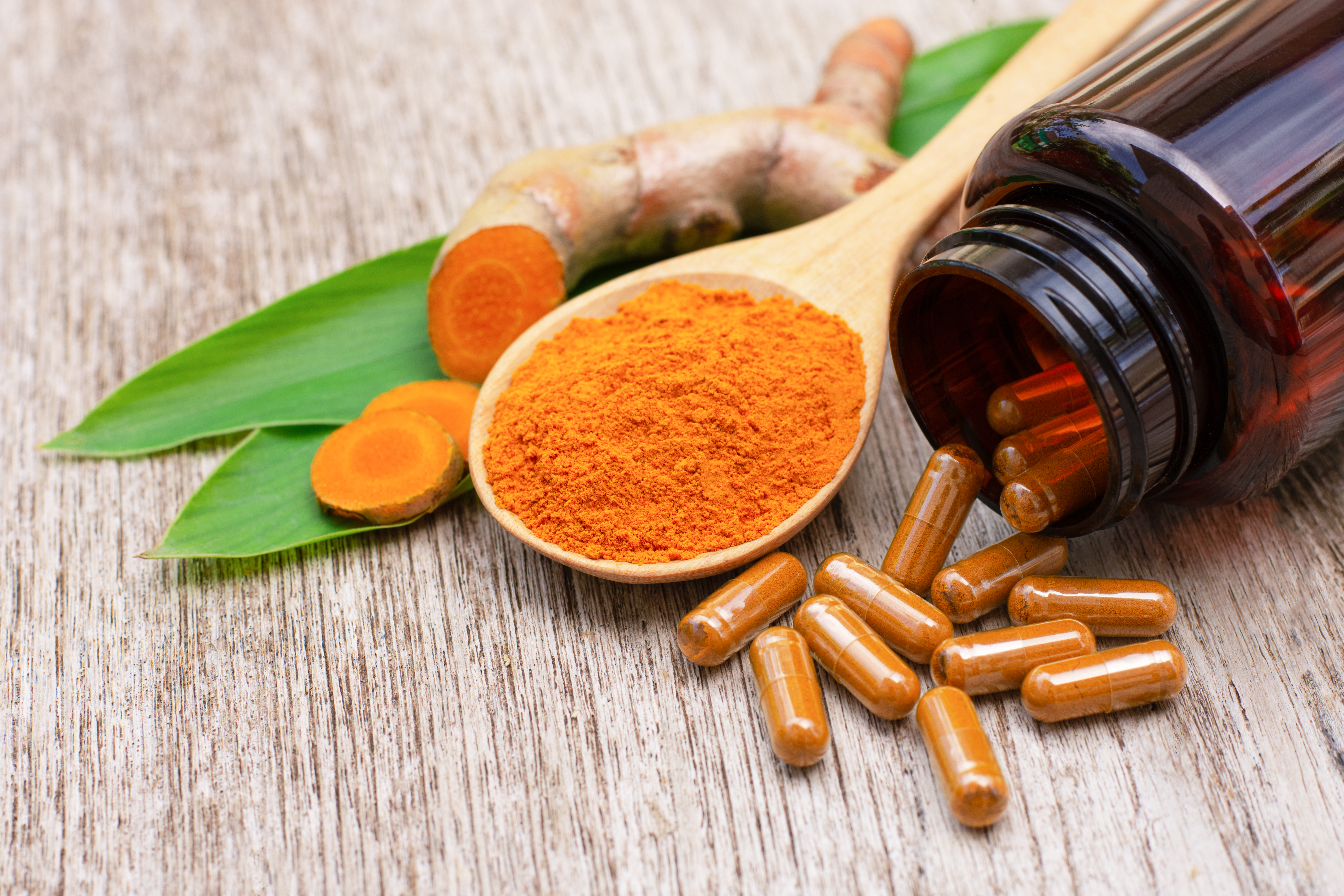INTRODUCTION
Curcumin is a bright yellow chemical produced by plants of the Curcuma longa species. It is the principal curcuminoid of turmeric (Curcuma longa), a member of the ginger family, Zingiberaceae. It is sold as an herbal supplement, cosmetics ingredient, food flavoring, and food coloring.
Chemically, curcumin is a diarylheptanoid, belonging to the group of curcuminoids, which are phenolic pigments responsible for the yellow color of turmeric.
| Synonyms | 1,7-Bis-(4-hydroxy-3-methoxyphenyl)-1,6-heptadiene-3,5-dione Turmeric yellow Diferuloylmethane |
| CAS no. | 458-37-7 |
| EINECS no. | 207-280-5 |
| Molecular formula | C21H20O6 |
| Molecular weight | 368.39 |
| Structure |  |
Applications
Widely used in food, dishes, cakes, candy, canned drinks, cosmetics & medicine coloring.
Some Health Benefits:
| Turmeric contains bioactive compounds with powerful medicinal properties |
| Curcumin is a natural anti-inflammatory compound |
| Dramatically increases the anti-oxidant capacity of the body |
| Boosts brain derived neurotrophic factor, linked to improved brain function and a lower risk of brain diseases |
| Curcumin should lower the risk of heart disease |
| Curcumin can help prevent (and perhaps even treat) cancer |
| Curcumin may be useful in preventing and treating Alzheimer’s disease |
| Arthritis patients respond very well to curcumin supplements |
| Curcumin has incredible benefits against depression |
| Curcumin may help delay aging and fight age related chronic diseases |
| Grades available |
|---|
| 1. Curcumin 95% |
| 2. Curcumin 95% Solvent Free |
| 3. Curcumin 95% Ethanolic Extract |
| 4. Curcumin Water Dispersible 10% & 20% |
SPECIFICATIONS
| Test | Test Method | Specification |
|---|---|---|
| Physicochemical Tests | ||
| Botanical name | – | Curcuma longa |
| Plant part used | – | Rhizome |
| Herb ratio | – | 25:1 |
| Description | Visual | Orange yellow coloured powder |
| Loss on drying at 105°C | USP<731> | NMT 2.0% w/w |
| Assay | ||
| Curcuminoids content | by HPLC | NLT 95% w/w |
| Total Heavy metals | USP<231> | NMT 10 ppm |
| Arsenic | ICP-MS | NMT 1.0 ppm |
| Lead | ICP-MS | NMT 3.0 ppm |
| Mercury | ICP-MS | NMT 0.1 ppm |
| Cadmium | ICP-MS | NMT 1.0 ppm |
| Microbiological analysis | ||
| Total plate count | USP<2021> | NMT 1000 Cfu/gm |
| Yeast & Mould | USP<2021> | NMT 100 Cfu/gm |
| Salmonella | USP<2022> | Absent |
| Escherichia coli | USP<2022> | Absent |
| Staphylococcus aureus | USP<2022> | Absent |
| Pseudomonas aeruginosa | USP<2022> | Absent |
STORAGE
Store in a cool, dry, well – ventilated warehouse. Stay away from fire and heat. Prevent direct sunlight.
PACKING
25 kg drum.
DMF status
Available US-DMF filed with US FDA.
No matter the quantity you need, our exceptional quality and service will make ExSyn your supplier of choice! If you need any additional information or SDS, please contact us.
Iodine is anon-metallic, dark-grey/purple-black, lustrous, solid element. It is the heaviest and the rarest of stable halogens that can be found on the crust of earth.About fifty percent of all iodine produced and manufactured worldwide is used to form Organoiodine compounds. Iodine is an important element for many health-sustaining processes and essential for human thyroid health.
The product, acronymed Oct-NBE, is an organic compound with a cyclic ring system and a 8-membered hydrophobic chain. The structure renders the chemical special properties leading to its applications in diverse fields.
Nicotine is a hygroscopic, colorless to slight yellow, oily liquid, that is readily soluble in alcohol, ether or light petroleum. It is widely used recreationally as a stimulant and anxiolytic.
The product, acronymed ETD, is an organic compound with a fused bicyclic ring system and an ethylidene group. The structure renders the chemical special properties leading to its applications in diverse fields.
Sodium perchlorate monohydrate is the inorganic compound with the chemical formula NaClO4•H2O. It is the common existence form of sodium perchlorate, which can gradually absorb water in the air to form the monohydrate. Sodium perchlorate monohydrate is white rhombic crystal which is highly soluble in water and in alcohol. Its capacity to undergo redox reactions, liberating oxygen atoms, has been harnessed in the preparation of specialty chemicals, including pharmaceutical intermediates and fine chemicals.
Triphenylphosphine is a common organophosphorus compound that is frequently abbreviated as PPh3 or Ph3P. It is widely used in organic and organometallic compound synthesis because it is an effective reducing agent as well as a neutral ligand. At room temperature, PPh3 crystals are relatively air-stable and colourless.
Potassium chlorate holds significant importance across various industries due to its diverse applications. This white crystalline compound has been utilized for centuries as an essential ingredient in the production of matches, fireworks, and explosives, owing to its ability to release oxygen upon decomposition.
Podophyllotoxin is a non-alkaloid toxin lignan extracted from the roots and rhizomes of Podophyllum species. It is an organic heterotetracyclic compound that has a Furonaphthodioxole skeleton bearing a 3,4,5-trimethoxyphenyl substituent.
Octadecylphosphonic acid (ODPA), a versatile chemical compound, serves as a surfactant and dispersant in applications spanning coatings, lubricants, and corrosion inhibition. With its hydrophobic octadecyl chain linked to a phosphonic acid group, it excels in surface modification, boosting adhesion in metal surfaces.
